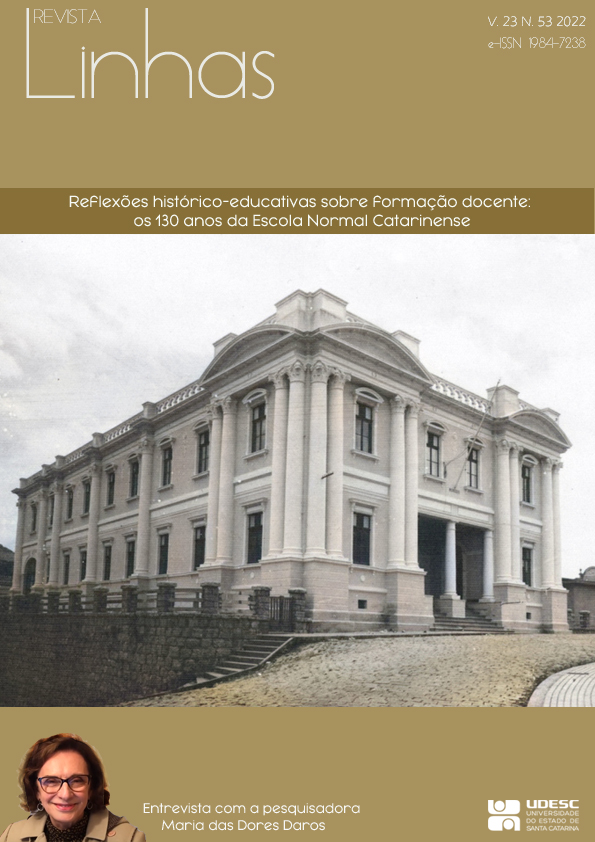Discovering, exploring, imagining: the influence of music on child development
DOI:
https://doi.org/10.5965/1984723823532022264Keywords:
music learning, children, discovery, child developmentAbstract
The project, Discovering, exploring, imagining: the influence of music on child development, was developed in a daycare and kindergarten activity room. Thus, through the observation of the interests and motivations of both groups, I found that the theme of greatest interest was convergent around music allowing me to establish a continuity between contexts, making the following question the major research question: To understand in what way the use of musical expression can or cannot contribute to the integral and integrated development of the child? The implementation of the project allowed me to achieve all the specific objectives, namely: reinforce activities of greater contact of the groups with different forms of expression and communication; understand how music contributes to the development and learning of the child; allow the construction of a positive look of children about music and provide a contact with diversified materials in order to stimulate the intrusion of music. The pedagogical intervention project was supported in the action-research approach and the instruments for collecting information, such as observations, written, photographic and video records provided the construction of pedagogical documentation. During the project, the groups were always very receptive, interested and motivated during all the proposals presented, contributing to the progress of their motor, affective and cognitive skills, reflecting in the construction of new learning. The project led to an improvement in my attitude, making me more reflective professionally, with evident effects in the construction of new learning by the groups.
Downloads
References
ALVES, Inês Pereira; RIBEIRO, António José Pacheco. A música e a prosódia uma exploração pelo mundo animal. Brazilian Journal of Development, Curitiba, v.8, n.5, p. 38562-38581, maio 2022.
ANDRIES NOGUEIRA, Monique. A música e o desenvolvimento da criança. Revista UFG, [S. l.], v. 6, n. 2, p. 22-25, 2017. Disponível em: https://www.revistas.ufg.br/revistaufg/article/view/48654. Acesso em: 9 maio 2021.
BRASIL. Ministério da Educação. Secretaria de Educação Fundamental. Referencial curricular nacional para a educação infantil. [Brasília: MEC], 1998. v. 3. Disponível em: http://portal.mec.gov.br/seb/arquivos/pdf/volume3.pdf. Acesso em: 9 maio 2021.
COUTINHO, Clara; SOUSA, Adão; DIAS, Anabela; BESSA, Fátima; FERREIRA, Maria José; VIEIRA, Sandra. Investigação - Ação: Metodologia Preferencial nas Práticas Educativas. Psicologia, Educação e Cultura, Carvalhos, v. XIII, n. 2, p. 455-479, 2009.
ESTEVES, Bruna Loureiro; RIBEIRO, António José Pacheco. Expressão e comunicação na creche e no jardim de infância: a música e seu contributo no desenvolvimento de múltiplas linguagens. Brazilian Journal of Development, Curitiba, v.8, n.4, p.31623-31637, abr. 2022.
GORDON, Edwin. Teoria da aprendizagem musical: competências, conteúdos e padrões. Lisboa: Fundação Calouste Gulbenkian, 2000a.
GORDON, Edwin. Teoria da aprendizagem musical para recém-nascidos e crianças em idade pré-escolar. Lisboa: Fundação Calouste Gulbenkian, 2000b.
HOHMANN, Mary; WEIKART, David. Educar a criança. Lisboa: Fundação Calouste Gulbenkian, 2004.
ILARI, Beatriz Senoi. Bebês também entendem de música: a percepção e a cognição musical no primeiro ano de vida. Revista da ABEM, Porto Alegre, v. 7, p. 83-90, set. 2002.
ILARI, Beatriz. A música e o cérebro: algumas implicações do neurodesenvolvimento para a educação musical. Revista da ABEM, Porto Alegre, v. 9, p. 7-16, set. 2003.
JEANDOT, Nicole. Explorando o universo da música. São Paulo: Ed. Scipione, 2001.
MAHONEY, Abigail Alvarenga; ALMEIDA, Laurinda Ramalho de. Afetividade e processo ensino-aprendizagem: contribuições de Henri Wallon. Psicologia da educação, São Paulo, n. 20, p. 11-30, jun. 2005. Disponível em http://pepsic.bvsalud.org/scielo.php?script=sci_arttext&pid=S1414 69752005000100002&lng=pt&nrm=iso. Acesso em: 11 maio 2021.
MARTINS, Vânia Sofia Rodrigues; RIBEIRO, António José Pacheco. A música e as emoções no jardim de infância: sentir para aprender. Brazilian Journal of Development, Curitiba, v.8, n. 2, p. 11494-11507, fev. 2022. Disponível em: https://www.brazilianjournals.com/index.php/BRJD/article/view/44069/pdf. Acesso em: 30 mar. 2022.
MÁXIMO-ESTEVES, Lídia. Visão panorâmica da investigação-ação. Porto. Porto Editora, 2008.
OLIVEIRA-FORMOSINHO, Júlia; FORMOSINHO, João. Prefácio. In: MÁXIMO-ESTEVES, Lídia. Visão panorâmica da investigação-acção. Porto: Porto Editora, 2008. p. 7-14.
PARENTE, Maria Cristina. A construção de práticas alternativas de avaliação na pedagogia da infância: sete jornadas de aprendizagem. Braga: Universidade do Minho, 2004.
RODRIGUES, Helena . Pequena crónica sobre notas de rodapé na Educação Musical. Boletim da Associação Portuguesa de Educação Musical, Lisboa, n. 99, 15-52, out. 1998. Disponível em: http://hdl.handle.net/10362/12569. Acesso em: 13 maio 2021.
SILVA, Isabel Lopes da. (coord.). Orientações Curriculares para a Educação Pré-Escolar. Lisboa: Ministério da Educação, 2016.
SILVA, Leda Maria Giuffrida. A expressão musical para crianças de pré-escola. São Paulo: FDE, p. 88-96, 1992. Série Idéias, n. 10. Disponível em: http://www.crmariocovas.sp.gov.br/pdf/ideias_10_p088-096_c.pdf. Acesso em: 25 maio 2021.
SPODEK, Bernard. Manual de investigação em educação de infância. Lisboa: Fundação Calouste Gulbenkian, 2002.
Downloads
Published
How to Cite
Issue
Section
License
Copyright (c) 2022 Revista Linhas

This work is licensed under a Creative Commons Attribution-NonCommercial-NoDerivatives 4.0 International License.
Os artigos publicados pela revista são de uso gratuito, destinados a aplicações educacionais e não comerciais. Os direitos autorais são todos cedidos à revista. Os artigos cujos autores são identificados representam a expressão do ponto de vista de seus autores e não a posição oficial da Revista Linhas ou do Programa de Pós-Graduação em Educação da Universidade do Estado de Santa Catarina.

A Revista Linhas está licenciada com uma Licença Creative Commons - Atribuição-NãoComercial-SemDerivações 4.0 Internacional.


